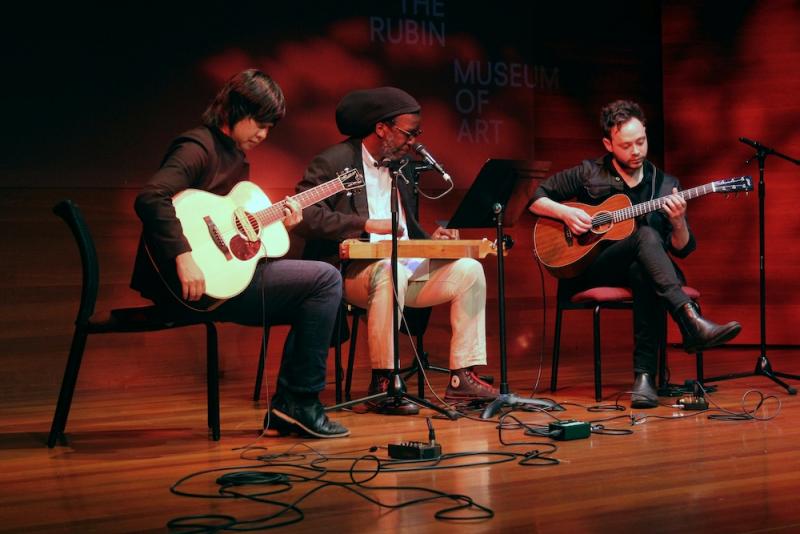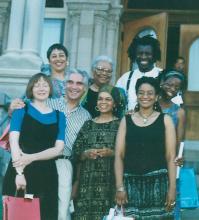Everything is Better with a Beat: A Conversation with Poet Cornelius Eady

Cornelius Eady (center) performs at the Rubin Museum of Art with the Cornelius Eady Trio. Photo by Karin Kolheimeier
As a former professional singer, I’ve sung a lot of poetry set to music over the years. And I’ve sung jazz standards in more than a few smoky bars, too. But I’m new to the world of jazz poetry. The significant jazz poet, Cornelius Eady—an NEA Literature Fellow—was generous to teach me about this art form during a recent interview, and now I’m totally hooked! It is my pleasure to share what he taught me.
NEA: What is your definition of jazz poetry?
CORNELIUS EADY: It’s a form where there’s space for both the words and for the music, but also for the possibility of improvisation. My first introduction to it came from a Black poet named Michael Harper. He came to a summer workshop that I participated in in my hometown of Rochester, New York. He had just published his first book, which was called Dear John, Dear Coltrane, and when he did his reading he played a tape of Coltrane playing “A Love Supreme,” and, he read his poem against that. That was the first time I ever experienced that combination, and it was really very powerful. I only had him for a week, but he made a huge impact on me, on my writing. I began by writing poems about jazz musicians, because I suddenly realized that, even though they don’t write on the page, they are writers and artists and as such deserve to be seen and heard as artists.
NEA: In addition to being a celebrated poet, you are also a singer, and a leader of music ensembles. For you personally, how do poetry and music intersect?
EADY: They’re cousins in my mind. The difference comes from the intention of delivery. When I’m writing a poem, I’m writing it to be read either aloud or read by the reader, and it has its own built-in music and sound that is meant just for the reader or for the listener. Composing a song is a little more complicated because you have to come up with an interesting lyric, you also have to support a melody, an arrangement and, if you’re working with a band, you have to have to give some space for the musicians to find their own way into the form.
NEA: In preparation for this conversation I’ve been enjoying reading your poetry and listening to your music. Can you tell me about your early life growing up in Rochester and what experiences early on sparked your interest in living the creative life that you lead today?
EADY: When I was growing up, there was a concerted effort to have the students in the city schools have some sort of exposure to music. They used to have Saturday music lessons that were taught by Eastman [School of Music] students, and I think it was like 75 or 50 cents. They asked you what instrument you’d like to play. There were a limited number of instruments so, by the time they got around to me and another friend of mine, nothing was left but the drums, so we became drummers, right? [Laughter.] The great thing about that for me was that my instructor, whose name was Richard Moore, somehow took a shine to me and arranged it so that I’d be the last lesson on the day on Saturday. He’d take me out to lunch, and then I’d just hang out for the rest of the afternoon with him and other Eastman students. We’d go back to the theater. We’d go into the practice rooms. We’d go to the dorms. We would be debating whether Jo Morella or Buddy Rich was a better player. So those were some of the seeds that sent me on this path. It was the ’60s and the ’70s, and rock was coming to its height. Bob Dylan was a big influence on a lot of these bands, as were the Beatles. So, like everyone else, I got an acoustic guitar and it went on from there.
NEA: In addition to your poetry being full of music and musical influences, it also deals with specific issues related to the Black experience, inequality, and concerns about social justice. Of course, these are all perennial concerns, but they’re certainly top of mind today. When you reflect on where we are in the middle of this reckoning today, what are your thoughts?
EADY: This last year in particular was complicated because you had the pandemic on top of everything else that’s going on with police killings. I think music is a real lifeline for a lot of people…it’s just as important as air, water, food, you know? You can sustain yourself without it, but it’d be like eating a dinner without any spices or flavoring to it. Everything is better with a beat.
NEA: You are the co-founder of Cave Canem, which is a long-time Arts Endowment grantee. Cave Canem is aimed at remedying the under-representation and isolation of African-American poets in the literary landscape. Has that experience transformed you in terms of your own work and the ways in which you think about poetry and community?
EADY: The thought of a world where African-American poetry could have a larger footprint was almost inconceivable back when I was a baby poet. You know, it was 30 years between Gwendolyn Brooks and Rita Dove winning Pulitzers for poetry. If publishers had one African-American writer or poet on their roster, they were considered incredibly open-minded and liberal. Doing something through Cave Canem that starts to enact a change, or change the perception of how we look at the landscape of American poetry, how those voices operate is, to me, the best activism I could possibly do in my life. To be able to say, "I had a hand in changing perception of 20th century poetry"—I can't fully tell you how much that means to me.
NEA: You’ve spent many years teaching at the university level. Do you have a particular philosophy that guides your teaching?
EADY: The thrill of being in a workshop with young writers who are just trying to figure out what they want to say and how they want to say it is sometimes the best work in the world for me. You can see what they're trying to dare themselves to do. You can see, if they stick with it, where they're going to be three or five years from now. They can't quite fully comprehend it themselves yet, a lot of them can't. But being there to mentor that, and to figure out the elements of their voice for the time that you see them is really exciting to me.
NEA: This is probably like asking you to choose from among your children, but I was wondering if you have a favorite poem that you've written or a favorite project that you've done.
EADY: You're right, it is like choosing from among your kids because it all shifts. When you said that, I started thinking of a music project that I did this summer with a sound artist named Jenny Johnson. It was a three-track EP that were elegies on George Floyd and two other people that got killed by police at that time. It began with an email exchange from one of my ex-students from Sarah Lawrence [College] to tell you the truth. My student emailed me and said, "Are you going to write a song about this? Are you going to write a poem about this?” And I emailed her back and I said, "I've written so many of these. I'm tired, and I'm not going to write about this anymore." And then, she threw something back at me that I might have said [to challenge her] when we were in workshop. The roles were reversed, and I had it coming. I think this project is one of the best things I've ever done in terms of music. What Jenny did with that text made it absolutely moving and beautiful, and I'm really happy that I did that. I'm also very happy about some of the poems I've written over the years. It's hard to point to one and say, "This is the best thing I've done." The needle always shifts for me.
One poem that resonates with a lot of people is the poem I wrote for my mother, "I'm a Fool to Love You," which is based on a story that she told me about how my father and my mother actually met up in Rochester. As my mother was telling me this story the little editor in my head started thinking, "Boy, this is a poem. All you’ve got to do is remember what she says, go home, and put it down." And that's what I did. The poem got published, and afterwards I asked my mother the same question about how they met, and she gave me totally a different answer! [Laughter.]
Ann Meier Baker is the National Endowment for the Arts Director of Music and Opera.
Cornelius Eady is the award-winning author of eight books of poetry as well as an opera libretto and numerous other works of music. He is also the co-founder, along with Toi Dericotte, of Cave Canem, an organization dedicated to cultivating the artistic and professional growth of African-American poets. Eady has also been a Guggenheim Fellow and received a creative writing fellowship from the National Endowment for the Arts in 1985.





